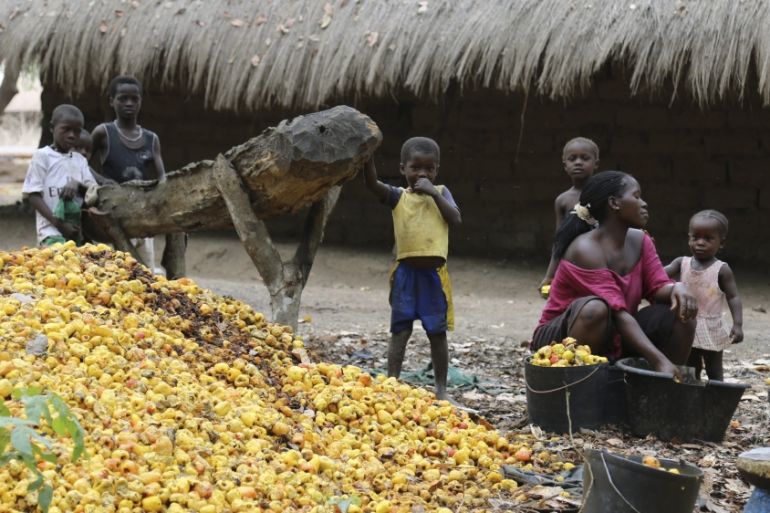Climate change and female farmers in Botswana
Poorer Botswana citizens struggle with increasingly unreliable rain-fed agriculture.

These are tough times for agriculture in southeastern Botswana, the most densely inhabited section of this semi-arid, southern African country. Anaemic rainfall in six of the past 10 years has meant poor harvests for the mostly female farmers in the region.
While rain-fed agriculture may be less and less viable, government programmes for small and medium scale irrigated gardening are pro-poor approaches to climate change adaptation that deserve international support.
Keep reading
list of 4 itemsTurtles swimming to extinction in Malaysia as male hatchlings feel heat
Could shipping containers be the answer to Ghana’s housing crisis?
Thousands protest against over-tourism in Spain’s Canary Islands
Botswana is a middle-income African country widely known for its wise stewardship of diamond resources that has allowed it to build critical infrastructure, educate its populace and prosper. Yet Botswana also has one of the highest rates of income inequality in the world. This poorer segment of the population tends to be more rural and has struggled with increasingly unreliable rain-fed agriculture.
![Drought stricken corn crop [Al Jazeera]](/wp-content/uploads/2015/06/6616d1c1492f495a8a9be667c7b55b10_18.jpeg)
About five years ago, the government launched a major backyard gardening initiative as part of the current president’s signature poverty eradication programme.
Poor households
This programme has targeted those who earn less than $1.25 a day as the government recognises that income inequality and poverty are major problems in this otherwise prosperous country.
While this programme has clearly had its successes, it also has problems that have received attention in the local Botswana press. These challenges include extremely poor households that have other priorities than gardening and, more significantly, a lack of access to affordable water for maintaining the gardens.
While it may be tempting to see backyard gardening as another failed government initiative, my interactions with a number of commercial and subsistence-based gardeners lead me to argue that the government of Botswana should frame backyard gardening as a pro-poor, climate change adaptation strategy worthy of international support.
Unlike large scale irrigated agriculture that often marginalise the poor, this small scale irrigated gardening approach explicitly targets the poor and women.
The International Panel on Climate Change’s fifth Assessment Report predicts that the impacts of climate change will lead to more drought which could have a negative effect for millions of people in the poorest parts of the world, especially Africa.
|
These changes could be quite significant for an area that is already marginal for agriculture.
|
While Botswana never received plentiful precipitation, 400-600mm of rainfall per year in some areas of the country was just enough to grow some rain-fed crops.
Of the climate models that have been used in Botswana, most forecast a 50-100mm decline in rainfall in the southern and southeastern parts of the country over the 2000-2050 period.
Climate change
These changes could be quite significant for an area that is already marginal for agriculture.
The major industrialised countries of the world have produced the vast majority of carbon emissions that are driving climate change today; the impacts of climate change, however, will be experienced most significantly in a number of African countries.
The global community increasingly recognises that adaptation efforts in the most severely impacted areas of the world deserve support from the world’s biggest carbon emitters.
While leafy vegetables are a traditional part of the Botswana diet, the gardening of vegetables for consumption is a more recent addition.
This is because traditional leafy crops were either a by-product of rain-fed crops, such as the leaves of bean plants, or literally plants that self-propagated in fields or open spaces. Sadly these traditional leafy vegetables have declined in local diets as anaemic rainfall has undercut their production and steadily increasing urbanisation has led to shifts towards more processed foods.
![A young girl feeds ducks and guinea fowl at a small family farm [AP]](/wp-content/uploads/2015/06/9c4f67c191f3446eabc06983753712f6_18.jpeg)
Government-supported backyard gardens allow for vegetable production and employ a number of water saving technologies, such as the use of shade nets to reduce evapotranspiration, highly efficient drip irrigation technology, and water barrels to capture rooftop rainwater.
Drought tolerant vegetables
This is not to say that these initiatives couldn’t be made even more efficient. For example, the growing of more drought tolerant vegetables could be prioritised and mulching techniques could be used to further reduce evapotranspiration.
Nonetheless, the fact remains that irrigated vegetable production may be the wave of the future for farmers in southeastern Botswana.
As compared to small backyard gardeners who struggle to secure access to affordable water, slightly larger, medium-scale vegetable farmers have access to borehole water and have demonstrated that they can do quite well by growing vegetables for local markets.
As such, the government needs to grant the smallest vegetable producers access to borehole water if they can prove that they are using this water as efficiently as possible. This may mean reallocating some water away from cattle ranching, an industry that has long held political sway over water and resource allocation in the country.
While backyard gardening started out as a poverty alleviation initiative in Botswana, it could prove to be an incredibly sensible climate change adaptation. This is an activity that helps the poor produce some of their own food and earn a living when rain-fed agriculture is increasingly unviable.
The government of Botswana took the risk to support backyard gardening and now this initiative deserves international support for its climate change potential.
William G Moseley is professor of geography at Macalester College. He currently is involved in collaborative research with the Department of Environmental Science at the University of Botswana. His latest book is Understanding World Regional Geography.
The views expressed in this article are the authors’ own and do not necessarily reflect Al Jazeera’s editorial policy.
